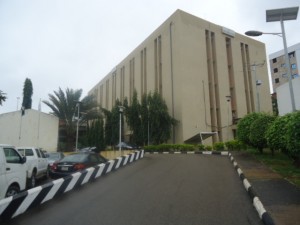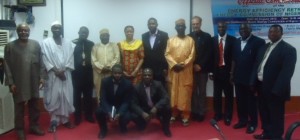The Energy Commission of Nigeria’s (ECN) head offices building in Abuja is to wear a new look – albeit energy consumption wise, thanks to an initiative of the United Nations Development Programme (UNDP) that will see the multi-storey edifice cut its power utilisation by 15,021 watts at peak period.

It represents about 50 percent of the amount of energy spent on lighting.
Estimated to cost over N20 million, the project entails the energy efficiency retrofit of the structure, which will be undertaken within two months. The project is part of the wider $3 million UNDP-Global Environmental Facility (GEF) Nigeria Energy Efficiency Programme (NEEP), which aims at promoting energy efficiency in residential and public sector in the country.
But the ECN building retrofit, which is being handled by Schneider Electric Nigeria, officially commenced last Wednesday following a brief ceremony. According to Etiosa Uyigue, the NEEP National Project Coordinator, the retrofit entails the replacement of the existing over 400 fluorescent lamps with LED ones, power the third floor lighting solely with solar energy, install sensor switches in common rooms and standardise circuit to reduce energy losses.

Olumide Fatoki of Schneider said that the project’s objective is to showcase the building as a model for public lighting using renewable energy. He described it has a landmark development in the sensitisation of the general public on the feasibility and benefits of green energy saving lamps.
He said, “Schneider is strongly committed to helping people make the most of their energy. This involves making the energy safe, reliable, efficient, productive and, most of all, green. We commit to bring to this project our wealth of experience and knowhow to ensure its timely completion and delivery.”
The ECN Director-General and Chief Executive Officer, Prof. A. S. Sambo, expressed appreciation to the UN Systems for picking the ECN building for the retrofit, saying that the endeavour would go a long way towards making more energy available.
He urged government and private sector agencies to commit finance towards making their buildings energy efficient. Besides promoting energy efficiency best practices in public buildings in Nigeria, he noted that the retrofit would likewise set the example for other public buildings to follow.
According to him, the ECN energy efficient project features: the replacement of incandescent lamps with one million high quality compact fluorescent lamps (CFL) across the nation; establishment of the National Centre for Energy Efficiency and Conservation at the University of Lagos; national awareness creation/capacity building nationwide; energy efficiency awareness campaign through posters, leaflets, handbills, radio and TV displays; and walk-through energy audit across the nation.
UNDP Country Director, Ade Mamonyane Lekoedje, thanked the ECN management for hosting the UNDP/GEF Energy Efficiency Programme, saying, “It is a reflection of the strong commitment of the Nigerian government to the promotion of just energy efficiency, and also to the laying of a strong foundation for a smooth transition to a green economy.”
According to her, energy efficiency is one of the pillars of the UN’s Sustainable Energy for All (SEFA) programme which, she disclosed, would complement the ongoing efforts of the Federal Government to increase access to electricity – energy saved is energy generated.
“This initiative is also coming at a time when the UNDP and the GEF, working in partnership with our national partners, the ECN and Federal Ministry of Environment, is implementing a project aimed at promoting energy efficiency in Nigeria. To date the project has succeeded in carrying out several capacity development trainings of the National Orientation Agency (NAO), Consumer Protection Council (CPC), the Nigerian Electricity Regulatory Commission (NERC), Manufacturers Association of Nigeria (MAN), Hotel Owners Forum Abuja (HOFA) and civil society organisations.
“The project is also currently working with the Standard Organisations of Nigeria (SON) to develop a comprehensive Energy Efficiency Policy and the necessary legal framework which will set a road map for the integration of energy efficiency considerations into national development processes and ultimately promote access to cleaner and sustainable energy. We are therefore very optimistic that the on-going GEF Energy Efficiency Programme is contributing significantly to the overall economic aspirations of the government of Nigeria.
“On our part, we will continue to support the Nigerian government to ensure that the objectives of the SEFA are achieved and will like to use this opportunity to call on other agencies of the Nigerian government, NGOs, international organisations, the diplomatic community and the private sector to give their support to this on-going laudable energy efficiency initiative and to emulate the good work of the ECN, by embracing energy efficient culture through practical retrofitting of their various installations as a way of conserving energy and addressing energy poverty in Nigeria. As we all know sustainable energy is the basis of sustainable development.”
